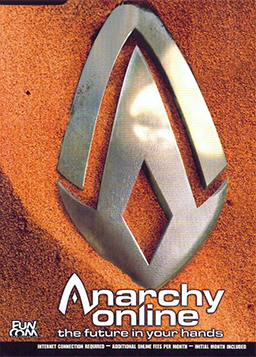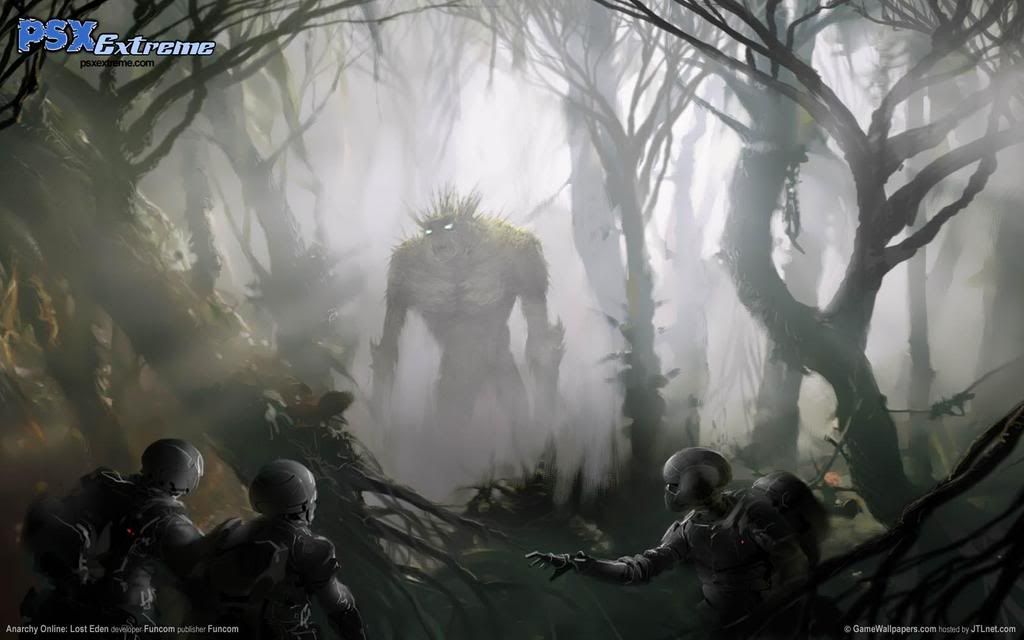Anarchy Online is an online role playing video game published by Funcom Productions. Funcom is also credited with the critically successful The Longest Journey, Dreamfall, and Age of Conan titles. Development of the science fiction themed game was headed by project director Gaute Godager and story developer Ragnar Tørnquist at a time when most role playing games made use of a more traditional fantasy setting.
As a Massively Multiplayer Onling Role Playing Game (MMORPG), customers log into a virtual world that persists indefinitely with or without player interaction. Players create custom characters that they improve by killing enemies, collecting resources, fighting each other, and various other activites. The game's ongoing storyline takes place on the distant planet Rubi-Ka, and its ravaged extra-dimensional twin.
Anarchy Online is often referred to by the infamous stability and registration issues present after its release in June 2001. The problems left users unable to register or access content for several weeks. It has since garnered positive reviews from major outlets overall, not least the Shadowlands expansion pack which was awarded with several Editor's Choice awards.
Gameplay
Gameplay in Anarchy Online is generally based on its predecessors and successors in the MMORPG genre. Players assume the role of a newly arrived colonist to planet Rubi-Ka where they create a unique character based on several professions, breeds, and sex. After crash-landing on the surface, they must choose to align themselves with either the Omni-Tek corporation, the rebel Clans, or to remain neutral. There is no specific goal that must be realized to win, nor is there any rigid gameplay structure. Instead the general object of the game is to continually improve the character's skills and abilities with, or against, other players. Each character's status is measured in "levels" ranging from 1 to 220. Progression through these levels comes as players earn experience points in a variety of ways.
In addition to killing creatures littered about the game world, players also complete quests or missions to gain experience. Missions are dynamically generated on-demand by the player who adjusts options such as how powerful its enemies will be, which tactics they prefer to use, and whether enemies are more likely to be humanoid or creatures. Other more difficult objectives, such as raids or encounters, are designed to require the cooperation of large groups of players to complete.
While progression is measured in levels, it has almost no direct impact on the player's abilities. Those abilities are determined by the game's skill system. At each new level, the character is rewarded with "Improvement Points" which are spent to increase skills of the player's choice, although the cost to increase is determined by their chosen profession. For example, the "Electrical Engineering" skill is much cheaper to members of the Engineer profession than it is to the Doctor profession. Characters are also rewarded with "Perks" after reaching certain levels which further augment skills. Following a free-form style progression system, Perks are chosen from tiered groups that increase specific types of skills. In a third method to augment skills even further, player's can designate a percentage of earned experience towards "Research." This type of progression is derived from the popular real-time strategy genre where resources, in this case experience points, are invested into research which eventually yield improvement to skills.
Players can attack each other by requesting a duel, or by entering areas where fighting is allowed. "Tower fields," found throughout the game, are one example of this type of area. Any formal group of players known as an "organization" that acquire a field can build "towers" on it which give skill bonuses to all members. The number of fields is limited, which encourages groups to fight the incumbent owners for control. Another venue for players to fight each other are the battle-stations, a series of enclosed domination style games that take place between the two factions. Each side must capture and hold points on a map to increase their score until the winning score of 500 is reached. Anarchy Online enforces a limit on the range on levels that players may attack each other. This is because of the relatively large difference between character abilities at different levels.
Daily administration of the game is managed by paid employees know as Game Masters. This staff is supplemented by an official group of volunteer players called Advisors of Rubi-Ka (ARK). Advisors help administrators answer problem reports in-game, provide new player orientation, and help coordinate both official and player-run events.
Story
Anarchy Online's plot revolves around the fight to control the fictional planet Rubi-Ka. Its original four year storyline was written and later directed by Ragnar Tørnquist, who also developed the stories for Funcom's The Longest Journey and Dreamfall titles. It was designed to be played out as a series of in-game events lasting from 2001 until 2005.
According to the game's official website, hyper-corporation Omni-Tek was granted a one thousand year lease to the desert planet on Jan 01, 28708 shorty after its discovery. It was a seemingly useless arid landscape far from civilization until the discovery of the mineral notum. That mineral's properties led to major leaps forward in nanotechnology that made possible the large-scale manipulation of matter, energy, and even resurrection from death. The first five hundred years of Omni-Tek's unfettered control of Rubi-Ka were marked with an exemplary worker treatment record, but as time passed the company's policies degraded into near totalitarianism. It was then that a significant number of poorly treated colonists rebelled and began to trade stolen notum to a rival corporation. These rebel groups, collectively calling themselves the Clans, fought a series of wars with Omni-Tek in the centuries leading up to the in-game timeline.
After the game's release, Tørnquist published his short fiction novel Prophet Without Honor (Anarchy Online Book 1) that serves as a historical primer. The story has since been extended beyond its original conclusion, but a second book was never written.
Role-players were often encouraged to participate and influence the outcome of the story during the first four years. This is evidenced in a New York Times article, published in 2003, about a well-known player named Rick Stenlund who used the game's message boards to organize an in-game rally in protest of a proposed change to gameplay. Administrators responded by preparing a role-play event with official characters and incorporating the rally into the official timeline.
Development
Development for Anarchy Online started as early as 1995 at Funcom's Oslo, Norway studios. The company was then only two years old with a relatively small number of developers, and the MMORPG genre was a niche market with few popular titles available. Management at Funcom believed that this genre would grow quickly in the following years, but some developers such as former project director Gaute Godager were not convinced. He later described the development team as "ambitious" in most facets. Virtually all MMORPGs and MUDs at that time including the two most successful, Ultima Online and EverQuest, were based on a more traditional role playing fantasy theme. Funcom chose to use a science-fiction theme instead, and the official announcement was made in 2000. The company grew substantially during the late 1990's, and by the time the game was released over 70 developers were employed to the project.
Anarchy Online's servers officially opened on June 27, 2001 after a public beta test that lasted several weeks. In its first month online the game suffered heavily from stability, registration, and billing issues. Customers reported they were unable to register using product keys provided with the installation discs. Others were accidentally billed the registration fee twice, although they were never billed for the second charge. Players were unable to access large portions of the game's content once logged in, as servers struggled to stay online. Funcom later announced that no customers would be billed for play time until the issues were resolved.
Initial release problems were eventually fixed, and by the second quarter of 2002 subscription numbers began to rise again reaching 150,000. Four expansions have since been published that customers can buy to extend the original game: The Notum Wars (2002), Shadowlands (2003), Alien Invasion (2004), and Lost Eden (2006). Periodic free updates are also released which fix bugs, add features, and release new content.
Reception
Anarchy Online's unique proposed features such as the science fiction setting, large playable area, and dynamic missions created significant interest leading up to the release date. The game was one month away from launching when it made its second appearance at the Electronic Entertainment Expo in 2001, and video game websites such as GameSpot had written pre-release articles. At the European Computer Trade Show that same year it was awarded Multiplayer Game of Show.
The game's launch problems had a strong negative effect with initial critics. Many larger video game sites chose to wait a month or more before publishing a formal review, and the troubled release is often briefly mentioned in later reviews of the game as a juxtaposition. It went on to be received favorably from most outlets, averaging a 7.6 out of 10 from GameSpy, GameSpot, and IGN. Caryn Law of GameSpy called it "a promising game with some big technical flaws." IGN descibed it as "a brilliant, engaging, profound MMORPG," but they added it came with "atrocious technical problems." PC Gamer magazine awarded it with Best Massively Multiplayer Game and described it as "the next great MMORPG."
The Shadowlands expansion was the most critically acclaimed by far, winning several Editor's Choice Awards from IGN, CNet, GameSpot, GameSpy and others after its release in 2003. Critics applauded the size and scope of the expansion, such as Andrew Park of GameSpot who called it "absolutely enormous." Craig Morrison of IGN praised the artistic style of the six new themed areas calling them "visually stunning." Micheal Lafferty of GameZone wrote that it "has depth in spite of its linear nature."
Alien Invasion's release in 2004 was not taken as well as the Shadowlands, although most scores were above 7 out of 10. The expansion, in critic's eyes, was not designed for new players. GameZone wrote, "...this is definitely targeted toward in-game organizations." They went on to say that it "certainly brings new depth to the title."
Most popular gaming websites chose not to review the Lost Eden expansion pack released in 2005. The expansion's content itself was well received, but critics pointed to the overall game's aging interface and visuals. Sarah Borger of Games Radar wrote that it "make[s] the world hard to interact with," but she went on to acclaim the new features.
Subscription
Anarchy Online uses a variation of the industry-standard Pay to Play business model. Customers must buy one month of access to the game for a flat rate, or multiple months at a discounted rate. The subscription model is broken down into three tiers. Users have the option of paying to play all of the game's expansions, paying to play only the Shadowlands expansion, or playing only the original game for free.
Funcom began offering the game's original content including the Notum Wars booster pack for free on December 15, 2004. In exchange, players are shown in-game advertisements provided by the Massive Incorporated advertising company. Images and videos are shown on static billboards placed in high traffic areas of the game. Paying customers have the option to replace these ads with ones for fictitious game-world products. The Free Play Program was originally advertised to last one year, but Funcom has extended the deadline every year since then as of 2008. These free players, known colloquially as "froobs" (free newbies), have become so common that Funcom incorporated the phrase into the game as a wearable t-shirt. Other online games have since offered indefinite free play with restricted content.









0 评论 for this post